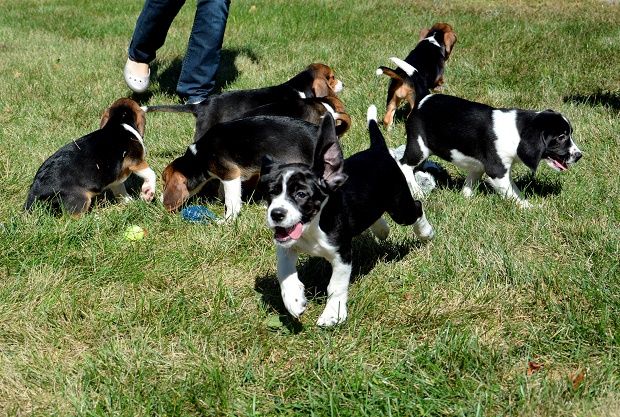Humans more sympathetic to dogs than people, study claims

This Sept. 29, 2015, photo provided by Cornell University College of Veterinary Medicine shows 7-week-old puppies born through in vitro fertilization at the Baker Institute for Animal Health in Ithaca, New York. (Cornell University College of Veterinary Medicine via AP)
Pet owners—particularly “dog parents”—can attest that unconditional love is best personified by the bond between humans and their furry friends.
Some even admit that they prefer dog companionship to human contact, and a recent study has proven this.
According to the study, conducted by researchers from Northeastern University in Boston, Massachusetts, people were more sympathetic toward dogs in need than circumstances involving suffering people.
The first experiment, as per the Times of London, was made possible by the UK Medical Research Charity, which staged two phony donation campaigns seeking monetary assistance for battered dogs and abused humans.
“Would you give 5 pounds to save Harrison from a slow, painful death?” the separate ads said, featuring a canine and human “Harrison.”
The fictional distressed pooch managed to collect significantly more contributions.
Meanwhile, Northeastern University professors Jack Levin and Arnold Arluke took a more scientific approach by examining opinions of 240 people who were exposed to four fictional news articles.
Each involved a harrowing scene involving an attack “with a baseball bat by an unknown assailant,” with the victims changing each time, from an adult and a human baby to a puppy and an adult dog.
As it turned out, the dog “victims” garnered more symphathy than their human counterparts.
“The fact adult human crime victims receive less empathy than do child, puppy, and full-grown dog victims suggests adult dogs are regarded as dependent and vulnerable not unlike their younger canine counterparts and kids,” Dr. Levin was quoted as saying in the report.
Furthermore, researchers also claimed that animals appear to be more helpless and less likely to defend themselves, which may explain for the results. Khristian Ibarrola /ra
RELATED STORIES:
Dogs make faces to communicate with humans, researchers discover
Labrador dogs genetically always hungry, scientists say














